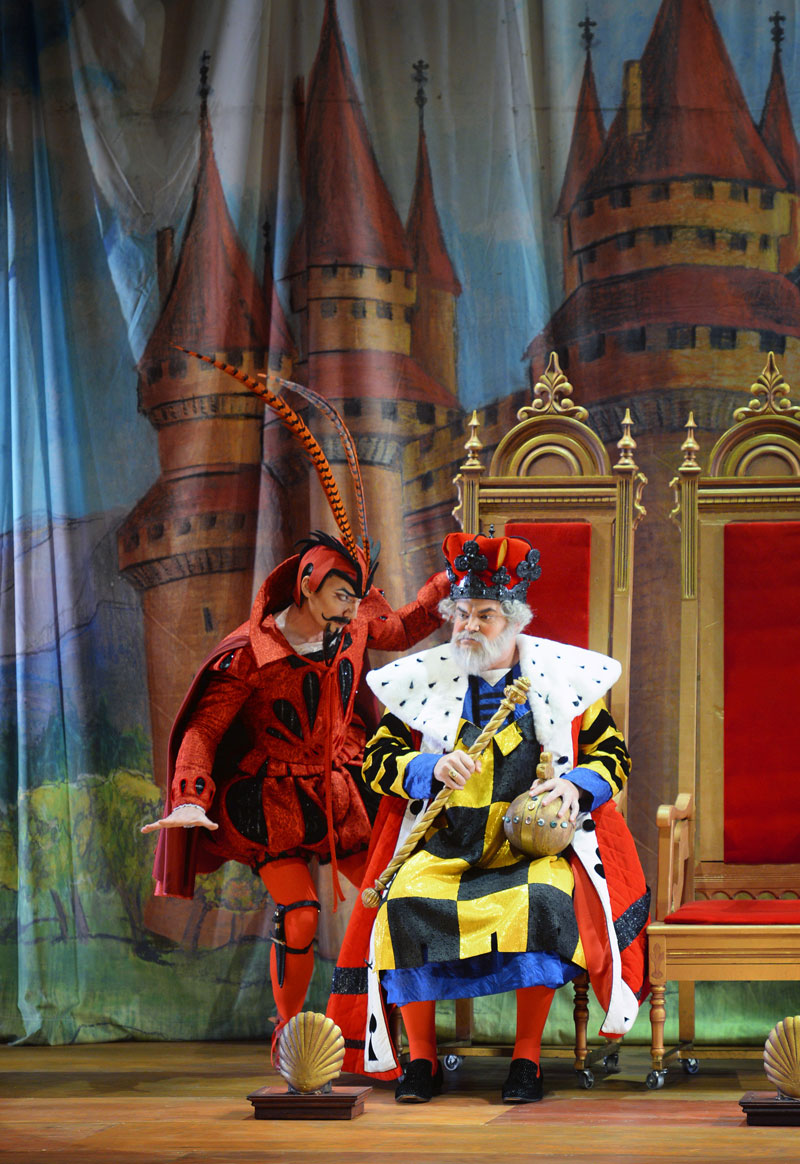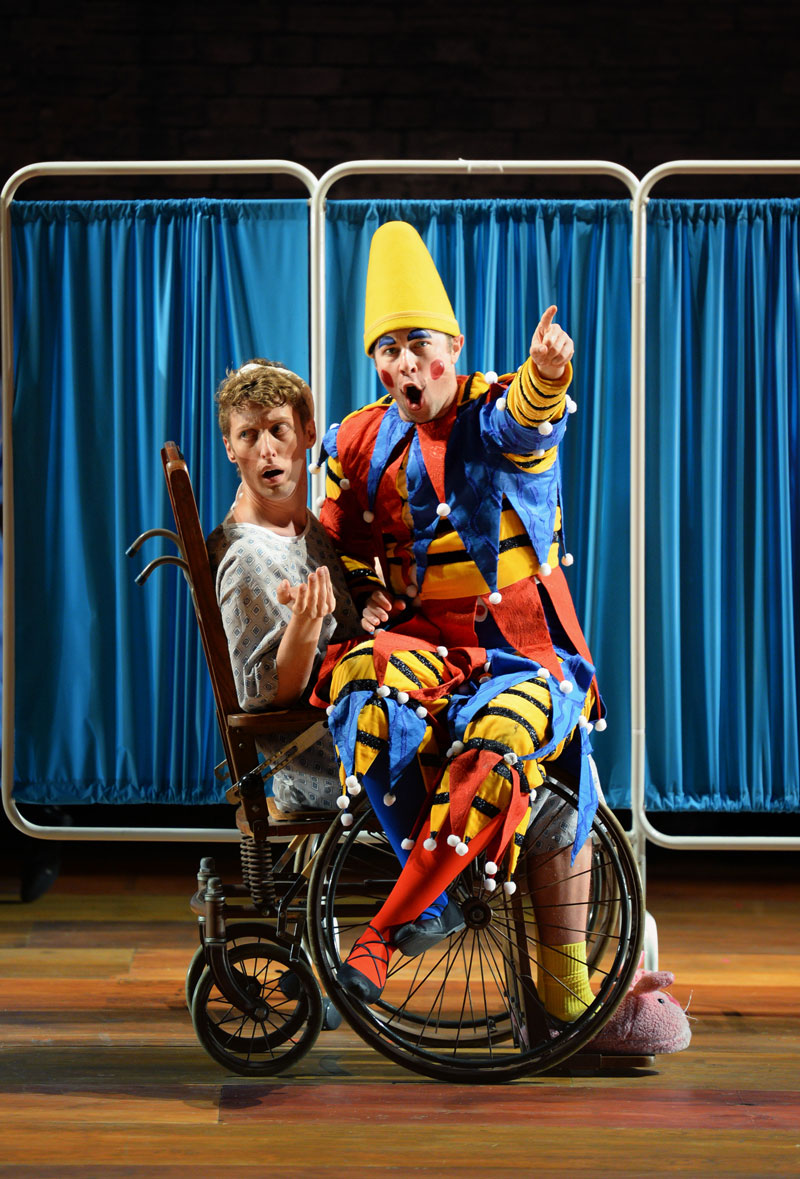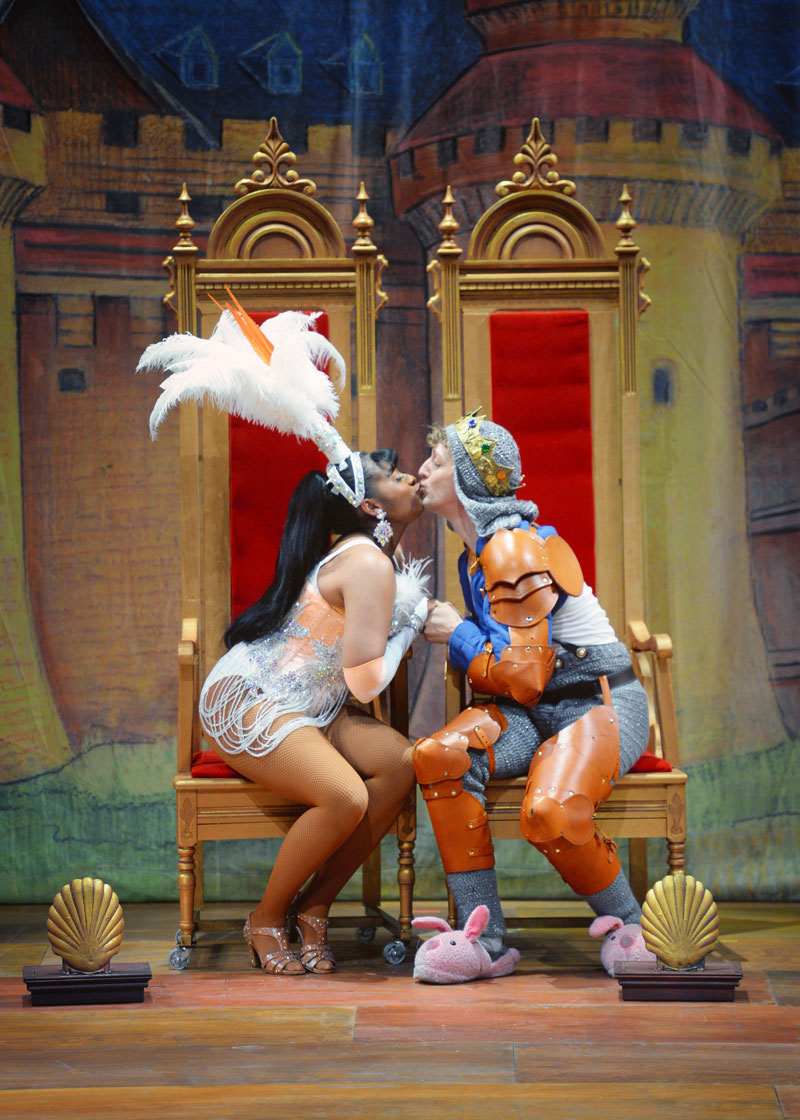If you enjoy an occasional unapologetic, boisterous paean to shamelessly infectious comic absurdity, well, please plunk your silly ass down, right next to mine.
In the case of Sergei Prokofiev and Vera Janacopoulos’ The Love for Three Oranges, Des Moines Metro Opera has gifted their public with as giddy and humorously imaginative a staging of this rarity as is likely possible. In this rollicking version of the piece, no lily goes ungilded, and the plot complications inevitably lead to schticky situations.
If you think that the inspired inclusion of a life-sized stuffed pink desert buffalo is too over-the-top, well, you were at the wrong address. That the performance was as dazzlingly sung and played as it was visually arresting will be dealt with here in good time, but first, three words:
Chas Rader-Shieber. Few have this director’s uncanny knack to inspire performers and designers to take such audacious risks, and to unite a team into such a laser-focused group endeavor. While the material has some inherent dramaturgical hiccups, “Team Oranges” saw them instead as golden opportunities and found ingenious methods to make this heady romp endlessly entertaining. The sold-out house roared and clapped their approval, making the proceedings not so much a performance as an “event.”

Three more words: Jacob A. Climer.
His astonishing set and costume designs are simultaneously bountiful and flamboyant, embodying multiple variations of “tongue-in-cheek,” with a nod to, and a riff on Commedia dell’arte. If Hieronymus Bosch and Cirque du So Gay had a love child, it would look like this visually explosive, multi-colored, weirdly wacky, relentlessly engaging production design.
And yet three more words: Evil. Ill. Devil.
They are all to be found in the word “Vaudeville,” which proves not only the perfect concept for this sometimes disjointed, sketch comedy of an operatic composition; but also as a marquee sign that hovers (mostly) above the performance, and whose individually bulb-lit letters, could be isolated to spell out “Evil” for the introduction of Fata Morgana, “Ill” for our first encounter with the ailing prince, and “Devil” for, well, you know who.
Could anything be more clever, and (pun intended) illuminating? DMMO chose to present the show in playwright Tom Stoppard’s aptly audacious English translation that was heavy on the jocular as it lunged toward the comic jugular. Between Rader-Shieber, Climer, and Stoppard, abetted by Connie Yun’s wondrous, spot-on (pun again intended) lighting and Brittany V.A. Rappise’s inventive make-up and hair design, it is hard to know where one creator’s vision began and the others’ inspiration merged, or if this was a group-think innovation. Regardless, it was a unified masterpiece of stagecraft.
David Neely worked his own magic in the pit, eliciting stylistically perfect results from the highly accomplished festival orchestra. Maestro Neely relished the myriad effects that Prokofiev devised and served them up with dexterity and high spirits. The numerous extended instrumental stretches were aural highlights marked by shimmering strings, jaunty winds, dynamic brass, and driving percussion. Every season, these talented musicians hail from all over the country, and Neely works wonders knitting them into a polished ensemble second to none.

One of the best (musical) jokes early in the night was the ostentatious trombone’s repeated one-note bleats, as a rather small child onstage mimed playing the herald trumpet. Another is that Maestro actually participated in certain stage business, breaking down any shred of the Fourth Wall that remained.
Lisa Hasson’s well-tutored chorus was a vital and vibrant component in the evening’s delights. They jump started the performance with concise, animated bickering as the groups of Advocates of Tragedy, Comedy, Lyric Drama, and Farce argue for their preferred genre before the curtain, before the Eccentrics settle the issue by informing them, they will in fact watch The Love for Three Oranges. And we’re off to the races with the choristers playing multiple roles and providing rollicking stage movement all over the stage and theatre.
As if more motion were needed, choreographer Isaac Martin Lerner put his accomplished dancers through complementary routines and scenarios, including an improbable boxing match between a man and carnival bear. The singing from the large cast of soloists was exemplary.
Bass Scott Conner, as the King of Clubs, set the bar very high with his opening declamations. His sizable, incisive phrases rang out in the hall. His pompous presence and self-important vocal shadings brought just the right tone to the character. Benjamin Taylor’s solid Pantalon, showed off a sizable, honeyed baritone that commanded attention and fell happily on the ear.
The animated, almost manic Trouffaldino embodied by the winning Michael Porter, was anchored by a poised tenor and mellifluous singing of very attractive timbre. As the slimy Léandre, Alexander Birch Elliott provides ample sleaze with ease, as he effortlessly rolls out his buttery, portentous baritone. Mezzo Catherin Martin conspired with him malevolently as a firmly voiced, well characterized Clarice.
In a coup of luxury casting, soprano Alexandra LoBianco undertook the role of the consummate villainess, Fata Morgana. Ms. LoBianco has previously thrilled DMMO audiences in The Girl of the Golden West and Turandot, but nothing in those successful performances could have prepared us for her total immersion in a big voiced, larger than life portrayal of this bundle of evil. A memorable scene pairs her with Anthony Reed’s assured turn as Tchélio, the magician who loses his powers to protect the King. Mr. Reed’s resonant bass, fine musical phrasing, and appealing demeanor were a pleasure to encounter.

Sun-Ly Pierce not only gave considerable pleasure with the sound of her plush, pliable mezzo, but also defined the duplicitous Sméraldine with consistently well-judged facial tics and twitchy posturing. At first, tenor Christopher Sokolowksi was the very picture of malaise as the moody, self-indulgent Prince with his mop of hair and his bunny slippers, although his well-placed singing had the shimmer of health. Once he conquers his malady and becomes fixated on tracking down the three oranges, Mr. Sokolowski is all goofy puppy dog, with unerring comic instincts, unleashing torrents of gleaming sound, each phrase more impressive than the last.
The demon Farfarello is well impersonated by José Olivares, a very promising Apprentice Artist. His virile, burnished bass-baritone brought good weight and presence to bear on his crucial scene. In their brief appearances as the two doomed princesses, Apprentices Araina Maubach (Linette) and Maggie Renée (Nicolette) made the most of every note. Ms. Maubach’s solid mezzo sported a womanly, dusky tone, and Ms. Renée’s plummy mezzo was even throughout the range.
Flora Hawk, as the Princess Ninette, escapes her sisters’ fate, even as she shared the same glam Vegas showgirl look. Ms. Hawk sang like royalty, her assured technique wedded to a freely produced, luxuriant soprano instrument. Moreover, she proved a deft comedienne with great timing.
Apprentices Spencer Lawrence Boyd and Jeremy Harr also left their mark, Mr. Boyd for lending his meaty lyric tenor to the Master of Ceremonies, and Mr. Harr for bringing his orotund, throbbing bass statements to the Herald.
In a cast of so many multi-talented “equals,” I have arguably saved the best for last. As the Cook, bass Matt Boehler walked off with the show in a unique star turn. Any production of this work must consider how they are going to present this giant woman that is sung by a man. Usually, it is a man in a large dress, on a wagon, or stilts, etc. Here, in a brilliant stroke, the Cook’s “voice” was provided by Mr. Boehler stage right, dressed in a black tux, with two dangling earrings, singing to a stand mic like a louche lounge lizard.
The physical embodiment of the cook is an oversized chef’s hat, two oversized hands, and an oversized ladle, all on sticks and operated by puppeteers. As they floated around menacing the Prince and Trouffaldino, Boehler simultaneously vamped, camped, slunk, and wriggled like (s)he had a libidinous itch to scratch. And (s)he sang well, too! This was “the” star turn of the evening, a perfect marriage of talent and opportunity.
I can’t imagine ever wanting to see The Love for Three Oranges again, having now been spoiled by Des Moines Metro Opera’s definitive production. Bravi tutti!
James Sohre
The Love for Three Oranges
Music by Sergei Prokofiev
Libretto by Sergei Prokofiev and Vera Janacopoulos
Based on Vsevolod Meyerhold’s adaptation of the play by Carlo Gozzi
King of Clubs: Scott Conner; Prince: Christopher Sokolowksi; Trouffaldino: Michael Porter; Fata Morgana: Alexandra LoBianco; Ninette: Flora Hawk; Léandre: Alexander Birch Elliott; Princess Clarice: Catherine Martin; Tchélio: Anthony Reed; Cook: Matt Boehler; Sméraldine: Sun-Ly Pierce; Pantalon: Benjamin Taylor; Linette: Araina Maubach; Nicolette: Maggie Reneé; Farfarello: José Olivares; Herald: Jeremy Harr; Master of Ceremonies: Spencer Lawrence Boyd; Conductor: David Neely; Director: Chas Rader-Shieber; Set and Costume Design: Jacob A. Climber; Lighting Design: Connie Yun; Make-up/Hair Design: Brittany V.A. Rappise; Choreographer: Isaac Martin Lerner; Chorus Master: Lisa Hasson
Top image: Alexander Birch Elliott as Léandre, Catherine Martin as Clarice, Alexandra LoBianco as Fata Morgana, Sun-Ly Pierce as Sméraldine.
All photos by Duane Tinkey courtesy of Des Moines Metro Opera.